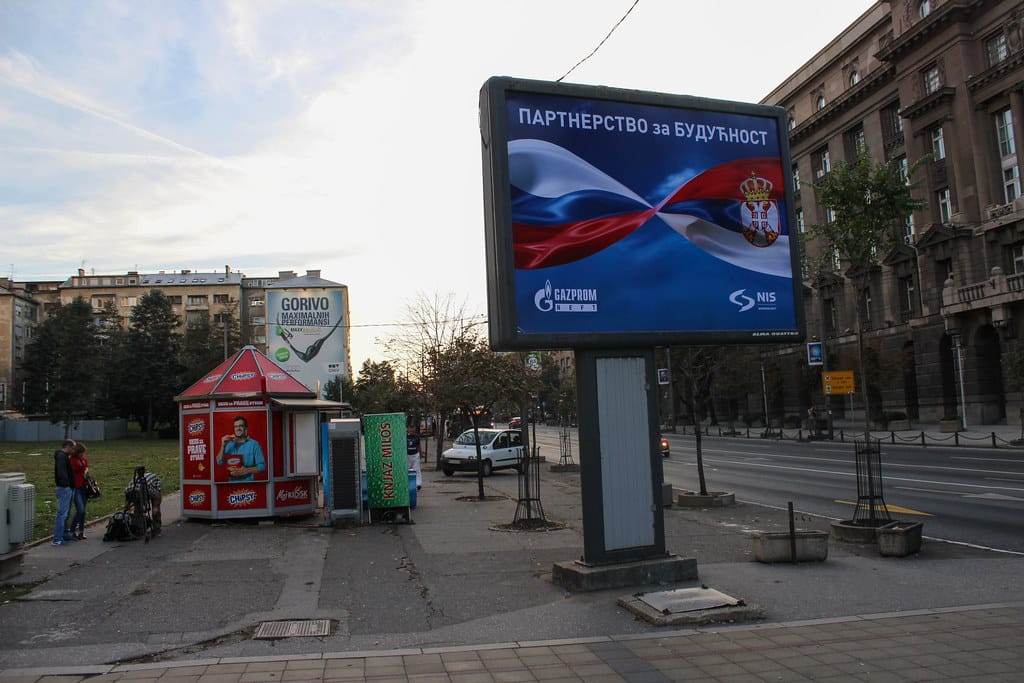Promotion of Russian-Serbian relations in Belgrade (Flickr)
Just like most countries in the world, the Serbian government condemned the Russian invasion of Ukraine. Yet, in Serbia the Wagner Group has put out an open application for mercenaries through a pro-Russian news outlet, claiming that the benefits of working for the notorious paramilitary group are tempting. The matter of Russian propaganda in Serbia is a concerning issue for European political stability.
Wagner in Serbia
The Wagner Group has already gained a de facto foothold in Serbia. In December 2022, it was announced via Telegram that the paramilitary organisation would open a “cultural and information centre” in Belgrade. The aim of the centre was to promote Russian-Serbian relations, the group said. However, in the current geopolitical state of affairs, this is a location where influence operations can be carried out to supply Serbian society with Kremlin propaganda. The EU fears in the Western Balkans that the war in Ukraine offers room for the expansion of Russia’s sphere. This expansion partially takes place through the Wagner Group.
Serbia is one of the countries where Kremlin propaganda has nestled into the general flow of information. As a result, it is also not surprising that a pro-Russian news site could openly run a public advertisement recruiting members for the Wagner Group, lately on January 5. The Serbian Press Council has said it has taken note of the article, which extensively discusses the benefits of working for the Wagner Group, but says itself it is powerless to act against it due to a lack of authority. The website which published the article does not recognise the Council’s authority. Furthermore, the secretary general of the Council mentioned that there have been no complaints regarding the article. The presence of the Wagner group in Serbia, which has clearly positioned itself as an extension of Putin, is of great concern. With tensions rising between Serbia and Kosovo, escalation is more plausible due to possible interference from the group. At the moment, Russia could benefit from escalating tensions on the European continent.
The Wagner Group’s operations in Ukraine’s East
The Wagner Group is currently involved in the bloody battlefield that is Bakhmut, a city that in recent months has been wiped away by Russian missiles and finds itself in a position of stagnation with soldiers fighting from the trenches. Yevgeny Prigozhin, the leader of the Wagner Group – also known as “Putin’s Chef” promised Putin to take over this city months ago. For him, it is an absolute necessity to take a victory here as his credibility as a potential political leader is at stake. Prigozhin criticised the Russian military several times for the lack of advances in the war with Ukraine but is currently not making any himself either. Nevertheless, it is a great advantage for Putin to have the industrious Prigozhin, who takes on much of the demanding fight in Bakhmut.
Recently, the Wagner Group claimed to have taken the Ukrainian town of Soledar. Ukrainian authorities, who have long indicated that the situation in the region is dire, contradict the Russian reports. Despite the fact that Bakhmut has not yet been taken, Prigozhin has shown that his paramilitary organisation is a force to be reckoned with in this war. But even outside the war in Ukraine, the group boasts many operations, mercenaries, and influence.
For instance, the group is also active in the war in Syria and in the Central African Republic. In the latter country, Human Rights Watch has indicated that Russian mercenaries from the Wagner Group are responsible for human rights violations against the country’s population. For example, residents of the Central African Republic are beaten, tortured, and executed by mercenaries. The Wagner Group’s presence in these countries is also an opportunity for Prigozhin to recruit new mercenaries for his prestige war in Bakhmut. Rebels from the Central African Republic have been spotted in Wagner Group operations at the frontline in Bakhmut. Former rebels tell stories of how they were abandoned to their fate without ammunition, food, and money – Ukrainian sources tell how mercenaries ran in waves to the opponent’s trenches to determine their position. For the Wagner Group, the human lives of their own mercenaries seem negligible, as are those of the people in the countries where they operate.
Serbia must do more to curb Russian influence
It is important for the whole of Europe to contain the Wagner Group’s sphere of influence. The possibility of openly recruiting mercenaries on the European continent is simply incompatible with European sanctions, policies, and general attitudes toward its support for Ukraine. Serbia, a country where feelings towards Russia are much more positive than in the rest of Europe, can become a catalysator for Russian influence in the Western Balkans and beyond. While the Serbian government has condemned the war in Ukraine, European forces must do their work to support make Belgrade a supportive actor toward Kyiv. Curbing the role of the Wagner Group in Serbia is a key part of that.
Author: Mathieu Neelen
Sources: BalkanInsight, BBC1, BBC2, BusinessInsider, CNN, Politico
Photo: Flickr



